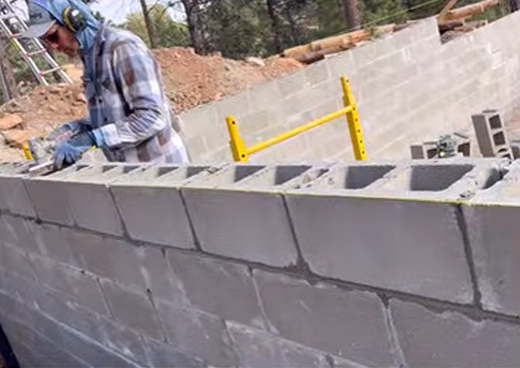Tips in Building a Reputation for Quality & Excellence in Construction
13 Lectura mínima
)
agosto 10, 2023
Building a reputation for quality and excellence is crucial for success in the construction industry. It sets your business apart from competitors and establishes trust with clients. In this article, we will explore the importance of reputation in construction, strategies for building a quality reputation, overcoming industry challenges, case studies of successful construction companies, and tips for maintaining and improving your reputation.
Understanding the Importance of Reputation in Construction
A strong reputation is the cornerstone of a successful construction business. It acts as a competitive advantage, attracting new clients and generating referrals. Reputation influences clients' perception of your company's capabilities, reliability, and professionalism.
Moreover, reputation plays a significant role in business growth. Positive word-of-mouth from satisfied clients can generate new opportunities, while a negative reputation can have detrimental effects on your business.
Building a solid reputation requires more than just delivering quality work. It involves consistently meeting deadlines, providing excellent customer service, and going above and beyond to exceed client expectations.
One way to enhance your reputation is through effective communication. Keeping clients informed at every stage of the construction process instills confidence and trust. Regular updates, progress reports, and addressing any concerns promptly contribute to a positive client experience.
The Role of Reputation in Business Growth
A good reputation is a catalyst for business growth. Reputation affects client decision-making processes, as they often rely on feedback from previous clients to make informed choices.
When you have a positive reputation, clients are more likely to trust your ability to deliver quality work, meet deadlines, and provide excellent customer service. This level of trust encourages repeat business and referrals, which helps strengthen your client base and expand your reach in the industry.
Furthermore, a strong reputation can attract partnerships and collaborations with other industry professionals. By establishing yourself as a reputable construction company, you increase the likelihood of being approached for joint ventures and larger projects.
It is important to note that reputation is not built overnight. It requires consistent effort and a commitment to delivering exceptional results. By focusing on maintaining a positive reputation, you lay the foundation for long-term success and sustainable growth.
How Quality and Excellence Impact Reputation
Quality and excellence are integral components of building a strong reputation. Delivering high-quality workmanship and exceeding client expectations demonstrate your commitment to excellence.
Consistently providing excellent results establishes your credibility and builds a reputation as a trustworthy and skilled construction company. A reputation for quality and excellence creates a positive perception among clients and differentiates your business from competitors.
Investing in the right tools, equipment, and materials is crucial for maintaining quality standards. By utilizing state-of-the-art technology and staying updated with industry best practices, you can ensure that your construction projects are of the highest quality.
Additionally, fostering a culture of continuous improvement within your organization contributes to maintaining excellence. Encouraging employee training and development, promoting innovation, and implementing quality control measures are essential for consistently delivering exceptional results.
Remember, reputation is not solely based on the end product but also the overall client experience. Providing exceptional customer service, being responsive to client needs, and addressing any issues promptly are all factors that contribute to a positive reputation.
Establishing Your Construction Business Identity
To build a reputation for quality and excellence, it is important to establish a clear construction business identity.
When it comes to the construction industry, a strong and well-defined identity can set you apart from your competitors. It not only helps you attract clients but also establishes trust and credibility in the market. By clearly defining your construction business values, effectively communicating them, and showcasing your expertise, you can create a powerful brand identity that resonates with your target audience.
Defining Your Construction Business Values
Defining your business values is the foundation for establishing your identity. Clearly articulating your core values sets the tone for your operations and sends a strong message to clients about the type of service they can expect.
Consider what qualities and values you want to be known for. Do you prioritize integrity, transparency, and collaboration? Or maybe innovation, sustainability, and customer satisfaction? Determine what values align with your business goals and incorporate them into your brand identity.
For example, if sustainability is one of your core values, you can emphasize your commitment to using eco-friendly materials and implementing green building practices. This not only showcases your dedication to the environment but also attracts clients who prioritize sustainability.
Communicating Your Brand Identity
Once you have defined your construction business values, effectively communicate them to clients. Consistent messaging across all communication channels, such as your website, social media, and marketing materials, is key.
Your website is often the first point of contact for potential clients, so make sure it reflects your brand identity. Use your website to tell your story, share your values, and highlight your expertise. Incorporate visually appealing elements, such as high-quality images of your completed projects, to create a lasting impression.
Social media platforms provide an opportunity to engage with your audience on a more personal level. Share valuable content related to the construction industry, showcase your ongoing projects, and interact with your followers. By consistently delivering valuable and relevant information, you can position yourself as an industry leader and build trust with your audience.
Marketing materials, such as brochures, flyers, and business cards, should also reflect your brand identity. Use compelling language to convey your commitment to quality and excellence. Showcasing your expertise through case studies or project highlights further solidifies your reputation in the industry.
Additionally, don't underestimate the power of networking and word-of-mouth referrals. Attend industry events, join professional associations, and actively participate in community initiatives. Building strong relationships with clients, suppliers, and other industry professionals can significantly contribute to your brand's reputation and identity.
In conclusion, establishing a clear construction business identity is crucial for success in the industry. By defining your values, effectively communicating them, and showcasing your expertise, you can create a strong brand identity that attracts clients and sets you apart from the competition. Remember, consistency and authenticity are key to building a reputable construction business identity.
Strategies for Building a Quality Reputation
Building a quality reputation requires a strategic approach. Consider the following strategies to enhance your reputation in the construction industry.
When it comes to building a quality reputation in the construction industry, several key strategies can help you stand out from the competition. By emphasizing quality in every project, maintaining consistency in your work, and building strong relationships with clients, you can establish yourself as a reputable and reliable construction company.
Emphasizing Quality in Every Project
Consistently delivering quality work is essential for building a strong reputation. This starts with attention to detail in every aspect of your projects, from planning and design to execution and completion.
Investing in skilled labor and using high-quality materials is crucial to ensure the longevity and durability of your work. By prioritizing quality, you can create structures that not only meet industry standards but also exceed client expectations.
Furthermore, taking pride in your craftsmanship and going the extra mile to deliver exceptional results can set you apart from other construction companies. By consistently delivering high-quality work, you can build a reputation as a trustworthy and reliable contractor.
Consistency: The Key to Excellence
Consistency is vital in establishing excellence as part of your reputation. Ensure that your work meets the same high standards on every project. Establish robust quality control processes and regularly review your operations to identify areas for improvement.
By maintaining consistency in your work, you can build trust with clients. They will know that they can rely on your ability to consistently deliver exceptional results, regardless of the project's complexity or scale. Consistency also strengthens your reputation in the industry, setting you apart as a reliable and capable construction company.
Moreover, consistency extends beyond the quality of your work. It also encompasses your communication, timeliness, and adherence to project schedules. By consistently meeting deadlines and keeping clients informed throughout the construction process, you can further enhance your reputation for excellence.
Building Strong Relationships with Clients
A reputation for quality and excellence is also built on strong client relationships. Communicate openly and transparently with clients throughout the construction process. Listen to their needs and concerns, and address them promptly and professionally.
Building strong relationships involves effective communication, excellent customer service, and a willingness to go above and beyond to ensure client satisfaction. By actively engaging with clients, you can foster trust and loyalty, which are essential for a positive reputation.
Additionally, maintaining strong relationships with clients can lead to repeat business and referrals. Satisfied clients are more likely to recommend your services to others, further enhancing your reputation in the industry.
In conclusion, building a quality reputation in the construction industry requires a strategic approach. By emphasizing quality in every project, maintaining consistency in your work, and building strong relationships with clients, you can establish yourself as a reputable and reliable construction company. Remember, reputation is not built overnight but is the result of consistent effort and dedication to excellence.
Overcoming Challenges in the Construction Industry
The construction industry presents unique challenges that can impact your reputation. It is essential to navigate these challenges effectively to maintain a positive image in the eyes of clients.
Construction projects are complex endeavors that require careful planning, coordination, and execution. From the initial design phase to the final construction, numerous factors can contribute to delays and setbacks. One of the most common challenges faced by construction companies is the unpredictability of weather conditions. Rain, snow, or extreme temperatures can hamper progress and prolong project timelines. Additionally, supply chain disruptions, such as material shortages or transportation issues, can further complicate matters. Moreover, unforeseen site conditions, such as hidden underground utilities or unstable soil, can pose unexpected obstacles.
To effectively deal with construction delays and setbacks, communication is key. Keeping clients informed about any potential issues and offering proactive solutions to mitigate their impact demonstrates your commitment to professionalism and transparency. Regular project updates, either through in-person meetings or detailed progress reports, can help manage client expectations and maintain their confidence in your ability to deliver on time. By effectively managing these challenges, you not only minimize the negative impact on your reputation but also build trust and long-term relationships with your clients.
Managing Client Expectations and Complaints
Client expectations play a crucial role in the construction industry. Misaligned expectations can lead to dissatisfaction and strained relationships. Therefore, it is essential to manage these expectations from the outset and ensure clear and open communication throughout the project.
When engaging with clients, it is important to set realistic project timelines and budgets based on thorough assessments and accurate estimates. By providing clients with a comprehensive understanding of the project scope, potential obstacles, and associated costs, you can help align their expectations with the realities of the construction process. This proactive approach not only minimizes the likelihood of misunderstandings but also fosters trust and transparency.
However, despite the best efforts in managing expectations, there may still be occasions where clients express dissatisfaction or raise complaints. In such situations, it is crucial to respond promptly and professionally. Actively listening to their concerns, empathizing with their frustrations, and offering viable solutions can help turn a negative experience into a positive one. Taking ownership of any mistakes or shortcomings and demonstrating a genuine commitment to rectifying the situation showcases your dedication to customer satisfaction. By effectively handling client complaints, you not only preserve your reputation but also have an opportunity to strengthen your relationship with the client and potentially earn their loyalty.
Case Studies of Successful Construction Companies
Looking at case studies of successful construction companies can provide valuable insights into building a quality reputation.
How Top Construction Companies Built Their Reputation
Examining the strategies employed by top construction companies can inspire and inform your approach to reputation building. Consider how these companies consistently delivered high-quality projects, established strong client relationships, and effectively communicated their brand identity.
By studying their successes and implementing similar strategies, you can position your construction business on a similar path to success.
Lessons to Learn from Industry Leaders
Industry leaders often set the standard for excellence in construction. Look for lessons to learn from their experiences, such as innovative practices, sustainable approaches, or unique customer service strategies.
By adopting these lessons and integrating them into your business model, you can enhance your reputation and set yourself apart in the industry.
Maintaining and Improving Your Reputation
Maintaining and improving your reputation requires ongoing effort and attention. It is a continuous process that involves self-reflection, adaptation to industry changes, and continuous learning and improvement.
Regularly Evaluating Your Business Practices
Regularly evaluate your business practices to ensure they align with your values and goals. Regular self-assessment helps identify areas for improvement and allows you to proactively address any potential issues that may impact your reputation.
Seek feedback from clients and employees to gain a comprehensive understanding of your strengths and weaknesses. Use this feedback to make informed decisions that contribute to the ongoing improvement of your business.
Adapting to Changes and Trends in the Construction Industry
The construction industry constantly evolves due to advancements in technology, regulatory changes, and shifting client preferences. To maintain a strong reputation, it is important to stay ahead of these changes.
Continuously educate yourself and your team on industry trends and best practices. Embrace new technologies and methodologies that can help enhance the quality and efficiency of your work.
Investing in Continuous Learning and Improvement
Investing in continuous learning and improvement is essential for maintaining a quality reputation. Encourage professional development among your team, ensuring they stay up-to-date with industry standards and best practices.
By prioritizing continuous learning and improvement, you are showcasing your commitment to excellence, and innovation, and staying at the forefront of the construction industry.
Conclusion: The Long-Term Benefits of a Quality Reputation in Construction
Building a quality reputation is a long-term investment for your construction business. It sets you apart from competitors, attracts new clients, and helps sustain business growth.
The Competitive Advantage of a Strong Reputation
A strong reputation provides a competitive edge in the construction industry. Clients are more likely to choose a construction company with a strong track record of quality and excellence. A positive reputation also increases the chances of winning bids and securing valuable projects.
The Role of Reputation in Sustainable Business Success
Reputation contributes to sustainable business success. A positive reputation leads to repeat business, referrals, and long-term client relationships. This stability and positive word-of-mouth create a solid foundation for continued growth and success in the construction industry.
Building a reputation for quality and excellence requires a strategic and ongoing effort. It requires a clear understanding of the importance of reputation, effective communication of your brand identity, a strong focus on quality and consistency, and the ability to overcome industry challenges. By learning from successful construction companies and continuously evaluating and improving your business practices, you can build and maintain a reputation that sets you apart as a leader in the industry.














